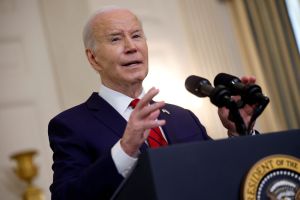The disinformation delusion
This week sees the release of the Aspen Institute’s report on “Information Disorder.” The commission responsible for the publication assembled representatives of the great and the good, including noted Ginsburg censor Katie Couric and First Amendment hater Prince Harry.
This latest blast in the war on “disinformation” trots out the usual arguments in favor of greater supervision over the news we all consume. “Merely elevating truthful content is not nearly enough to change our current course,” they argue.
By now the double standards and missteps of those who want to “flag,” ban and de-platform their way to a healthier democracy are well established. The Wuhan Lab Leak hypothesis was a dangerous, racist conspiracy theory until, well, the evidence suggested otherwise. The acquiescence of many in big tech and at-large media outlets to hardline trans ideology prevents the statement of obvious scientific fact.
In these cases and many others, the Kyle Rittenhouse trial being the most recent, the window of acceptable inquiry and discussion has been narrowed drastically — and has hindered us from establishing the truth.
Most worrying of all is the commission’s ahistorical call for more government oversight of news and information online. They complain that “the Federal Government lacks any clear leadership and strategy to the disinformation problem, despite its own acknowledgement of the impact on public health, elections, businesses, technology, and continued campaigns on communities of color, including immigrants and refugees.” This is mostly think-tank gobbledygook, but it nonetheless places a disconcerting deference to the government over questions of free expression.
The timing of the report’s publication only underlines the problem with the whole “disinformation” hustle. Just as we are being told about the need for tighter restrictions on the flow of news to the masses, we are witnessing the complete and utter collapse of the Steele Dossier story. It is as clear a reminder as you could wish for of the gullibility and fallibility of gatekeepers. The answer is not, as the Aspen commission would suggest, to give these people more control over what we read, watch or listen to.
*** Sign up to receive the DC Diary in your inbox every weekday ***
Ben Smith’s Steele silence
Speaking of the Steele Dossier, there’s been a curious silence on the subject from Ben Smith, the New York Times media columnist and arguably the journalist most closely read by other reporters hungry for industry insight. And yet, the story that Axios recently characterized as “one of the most egregious journalistic errors in modern history” has gone undiscussed by Smith in his column.
Could it be because Smith was editor-in-chief of BuzzFeed News when they decided to publish the Steele dossier in full? It’s also worth noting that Smith hasn’t let go of his BuzzFeed stock options. Ben, you had a starring role in one of the biggest media snafus in decades. Yet so far, all you’ve said, in a quote to Axios, is that the logic of publishing the dossier still holds. How about explaining yourself already?
Beto on Beto
Beto O’Rourke, punk rocker and voice of the Gen Xers, has announced the inevitable: he’s running for Texas governor. Because, hey, if you’ve got a failed Senate bid under your belt and your presidential campaign was over before it had begun in spite of fawning, Annie-Leibowiz-is-taking-your-picture media coverage, you should probable complete the trifecta and run for the top job in America’s second most populous state.
Announcing his candidacy in an interview with Texas Monthly, Beto — nothing if not a source of fatuous, faux-clever and politically suicidal one-liners (“We’re coming for your AR-15s”) — didn’t disappoint. Asked if he regrets running for president, he said: “I am moved by the opportunity to serve and to help and I was extraordinarily fortunate to have the chance to run in 2019. And no, it did not work out as well as I wanted it to. Somebody put it to me this way: I wanted to run in the worst way — and I succeeded in that.” So true.
After Leahy
Vermont Senator Patrick Leahy announced his retirement yesterday. Leahy, 81, has served in the Senate for nearly half a century. “It’s time to come home,” he said. His decision not to seek re-election creates several vacancies. There’s the vacant Vermont Senate seat, of course. But there’s also the role of president pro tempore of the Senate, which is generally reserved for the majority party’s most senior member and puts its holder third in line to the presidency.
The identity of his replacement, therefore, depends on the results of the midterms. If the Republicans take control of the Senate, Chuck Grassley, the 88-year-old Iowan, would be the senior lawmaker in line for the position. If the Democrats keep hold of the upper chamber, their next longest serving senator, Dianne Feinstein, 88, would, by convention, take up the post. Given concerns about Feinstein’s cognitive decline, few will find that an especially reassuring prospect. It would also mean that the second, third and fourth slots in the presidential line of succession were all occupied by women from the Bay Area: Kamala Harris, Nancy Pelosi and Feinstein.
What you should be reading today
Michael R. Auslin: America needs more than guardrails with China
Amber Athey: The Rittenhouse prosecution shoots from the hip
Stephen L. Miller: Joe Biden’s sacrificial presidency
Jeff Greenfield, Politico: How Joe Biden could take down inflation
Choire Sicha, New York: Some ways to have Covid
William McGurn, Wall Street Journal: Biden’s spending gives Milton Friedman the last laugh
Poll watch
President Biden Job Approval
Approve: 42.1 percent
Disapprove: 52.6 percent
Net approval: -10.5 (RCP Average)
Voters were asked whether they support or oppose President Biden’s new spending package also known as Build Back Better
Support: 39 percent
Oppose: 46 percent (NRCC)


















